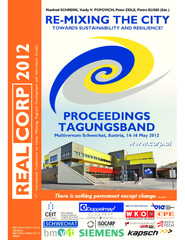Prikaz osnovnih podataka o dokumentu
Livability and Social Integration vs. Economic Crisis and Trends of Transition: Case Study of Local Planning in Belgrade
| dc.contributor | Schrenk, Manfred | |
| dc.contributor | Popovich, Vasily V. | |
| dc.contributor | Zeile, Peter | |
| dc.contributor | Elisei, Pietro | |
| dc.creator | Mitrović, Biserka | |
| dc.creator | Simeunčević, Sanja | |
| dc.date.accessioned | 2020-04-01T13:28:41Z | |
| dc.date.available | 2020-04-01T13:28:41Z | |
| dc.date.issued | 2012 | |
| dc.identifier.isbn | 978-3-9503110-2-0 | |
| dc.identifier.isbn | 978-3-9503110-3-7 | |
| dc.identifier.uri | https://raf.arh.bg.ac.rs/handle/123456789/535 | |
| dc.description.abstract | The paper discusses the negative influence of global economic forces and transition changes against the intention of local municipalities and local inhabitants to achieve better quality of life and better social integration in local environment. Strong economic crisis affecting cities worldwide and transition trends in post-socialistic countries are the most significant drive force of the development/decline of Serbian cities. It reflects on changing the city structure, lessening the functional diversity and shrinking the public space as most vulnerable and least profitable areas in the city. Public interest and the public space in the current context of legislation, arbitrary treatment of singular locations by some institutions and professionals and pressures of the capital is increasingly losing its significance. On the other hand, even in such conditions the awareness of local municipalities and local inhabitants about the quality of life as well as about the importance of involvement in participation process as a way to impact local livability has grown during the past decade. Such actions of local community rely upon the strong theoretical background focusing sustainable and integrative urban design approach and protection and enhancement of public space and public realm, as well as upon the principles of social integration and cohesion for the local community. Following the approach of “learning from mistakes“, the paper presents an example of treatment of sports and recreational facilities within residential areas in Belgrade in the current local planning practice, discussing how this treatment can be considered in sustainable way, resisting the transition trends and economic crisis forces and making the local city space more resilient and livable. As a result, this approach also brings other benefits to the city as whole, making planning procedures more effective and sustainable and creating additional value to the city areas. | en |
| dc.language.iso | en | sr |
| dc.publisher | Schwechat : CORP - Competence Center of Urban and Regional Planning | sr |
| dc.rights | openAccess | sr |
| dc.source | REAL CORP 2012. Re-Mixing the City. Towards Sustainability and Resilience? : Proceedings of 17th international conference on Urban Planning and Spatial Development in the Information Society | sr |
| dc.subject | Residential areas | sr |
| dc.subject | Belgrade | sr |
| dc.subject | Planning practice | sr |
| dc.subject | Transition trends | sr |
| dc.subject | Planning procedures | sr |
| dc.title | Livability and Social Integration vs. Economic Crisis and Trends of Transition: Case Study of Local Planning in Belgrade | en |
| dc.type | conferenceObject | sr |
| dc.rights.license | ARR | sr |
| dcterms.abstract | Митровић, Бисерка; Симеунчевић, Сања; | |
| dc.citation.spage | 447 | |
| dc.citation.epage | 452 | |
| dc.identifier.fulltext | https://raf.arh.bg.ac.rs/bitstream/id/1387/CORP2012_proceedingsMitrovicB.pdf | |
| dc.identifier.rcub | https://hdl.handle.net/21.15107/rcub_raf_535 | |
| dc.type.version | publishedVersion | sr |

